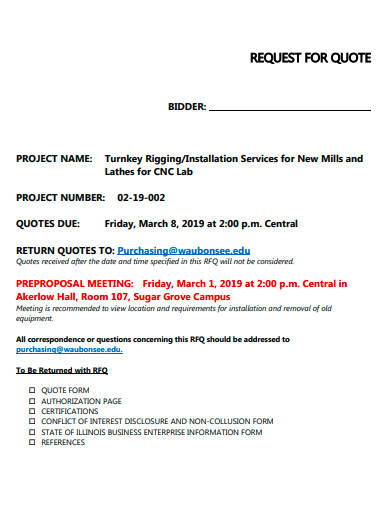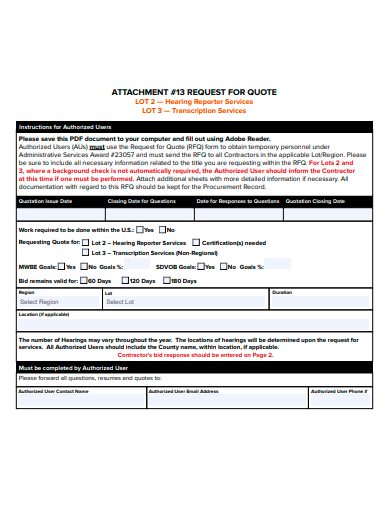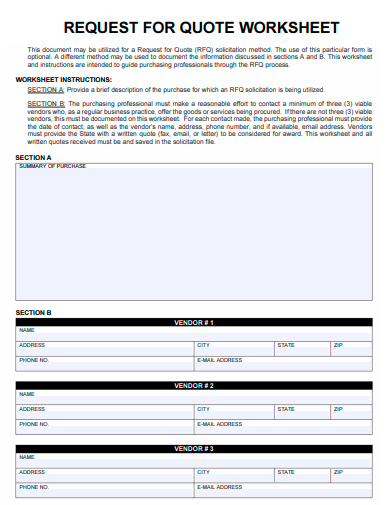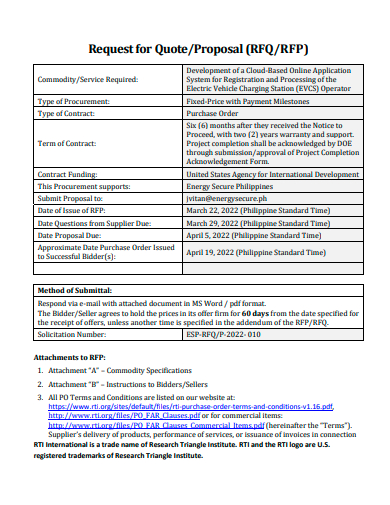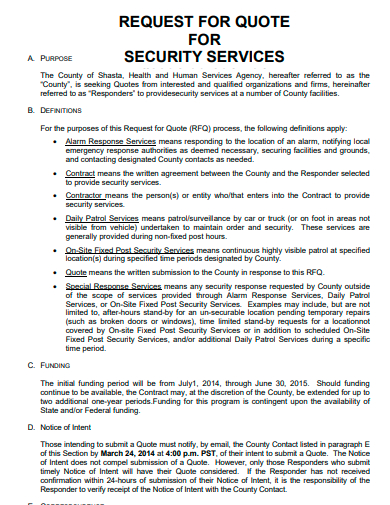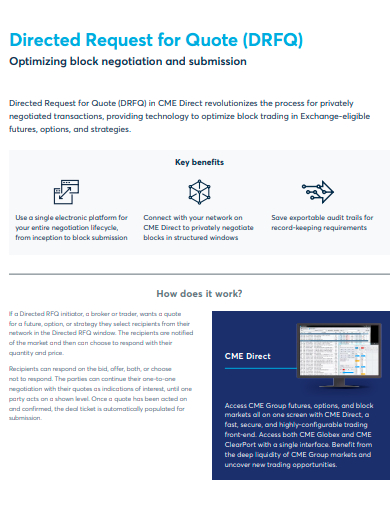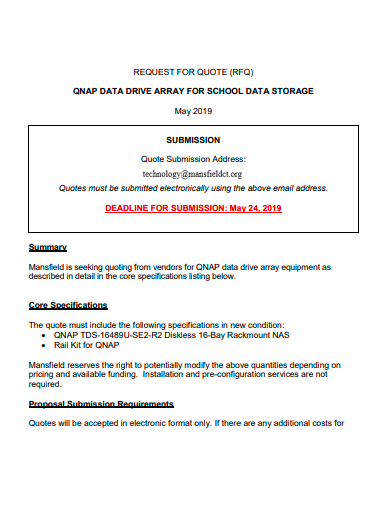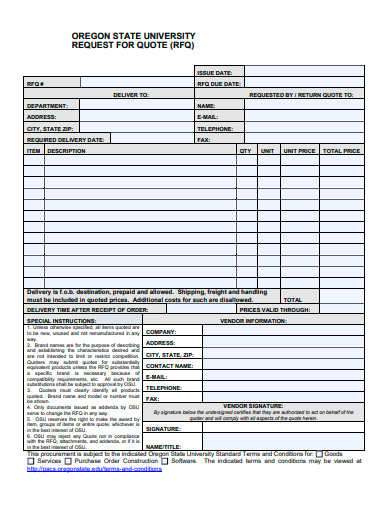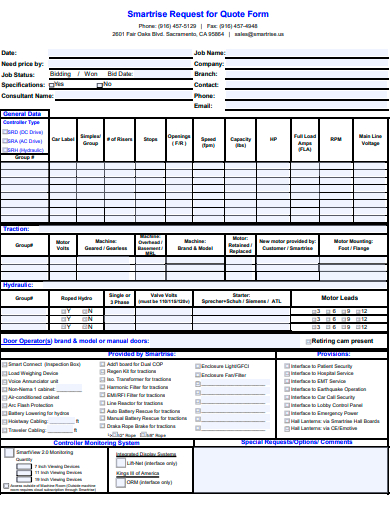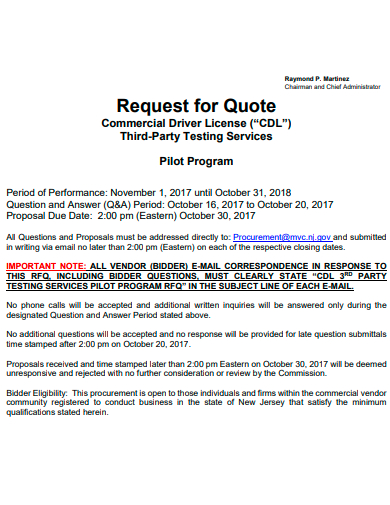In the process of submitting a request for a proposal, the RFQ is typically the first step taken (RFP). These two documents are comparable in that they contain information regarding the needed business project or managed services; requests for quotations (RFQs) typically ask for a more detailed pricing proposal. In addition, corporations often design RFQs for generic items for which the quantity required is already known. However, RFPs are reserved for one-of-a-kind projects in specialized marketing execution for which the quantity and the specifications are unknown.
FREE 10+ Request For Quote Samples
1. Request For Quote Template
2. Basic Request For Quote
3. Request For Quote Worksheet
4. Request For Quote Proposal
5. Formal Request For Quote
6. Request For Quote For Security Services
7. Directed Request For Quote
8. Request For Quote Example
9. University Request For Quote
10. Request For Quote Form
11. Request For Quote in PDF
What is a Request for Quote?
A corporation will use a process called a request for quote (RFQ), also known as an invitation for bid (IFB), to collect price quotations and proposals from a select group. Such as the sample suppliers and independent subcontractors if they are allowed to carry out specific task lists or project costs. The request for quote (RFQ) procedure is handy for companies that require a reliable supply of a predetermined quantity of regular products. Companies can send RFQs alone or in conjunction with a request for proposal (RFP).
How To Make a Request for Quote?
Specific components should always be included in a request for quotation, even though RFQs can vary depending on the industry and the firm’s requirements. You can start from scratch or look for available and applicable templates online. However, if you wish to make it on your own, we highly recommend you learn the steps and continue reading below.
1. Request For Proposals
Create a concise outline that summarizes all the important aspects included in the request for quotation, such as the quantity of the product, its features and specifications, the project deliverables, periodic intervals, and significant dates. Such as the date by which bids must be submitted and after which they will no longer be accepted.
2. A Review of The Company’s Operations
In the RFQ document, provide a comprehensive overview of the organization and its project needs. This provides vendors with a comprehensive understanding of the particular project requirements that buyers have, increasing the likelihood that vendors would submit bids.
3. Specifications For The Project
Make use of this part to provide specific information regarding the project and the goods and services being requested. Include specifics regarding the product specs, delivery dates, terms and conditions of the project, as well as other information.
4. Tender fees or deposits
There is a possibility that tender costs would be required for RFQs issued by governments and other public sectors. Cash deposits, known as “tender fees,” are payments made by sellers to buyers as a sign of their confidence in the bid. It is also possible to refer to the tender fee as an earnest money deposit (EMD).
What is a request for a quote?
Often referred to as an invitation for bid (IFB), a request for quote (RFQ) is a document sent to potential vendors to solicit price proposals from them in the event that they are selected to carry out a certain activity or project.
What is the main distinction between an RFP and an RFQ?
A request for a quote is known as an RFQ, whereas a request for a proposal is known as an RFP. The primary distinction is in the goals of each. You should send a request for quotation (RFQ) when you already have a clear idea of the product or service you desire and are primarily interested in learning its cost.
What comes next following the RFQ?
After the procuring company has finished drafting RFQs, they are distributed to prospective suppliers with whom the company may be interested in doing business. These suppliers are allowed to provide the procuring company with price quotations based on the specifications that have been outlined.
Requests for quotes are not the same as public announcements. Because the soliciting company only sends requests for quotes (RFQs) to companies in which it has complete faith, the company does not have to produce extensive procurement documents. In contrast to a public solicitation, private solicitations allow a corporation to get exactly the number of bids that it specifically requests, which allows for significant time savings.
Related Posts
Sample Material Lists
Sample Excuse Letter for School
Feature Writing Samples
FREE 14+ Sample Music Concert Proposal Templates in MS Word | Google Docs | Pages | PDF
FREE 10+ Security Guard Contract Samples in PDF | MS Word
FREE 10+ Assurance Agreement Samples In MS Word | Google Docs | Apple Pages | PDF
FREE 10+ Option to Purchase Agreement Samples in MS Word | Apple Pages | PDF
FREE 26+ Curriculum Form Samples in MS Word | PDF
FREE 20+ Cleaning Service Proposal Samples in PDF | MS Word
FREE 29+ Sample Loan Application Form Templates in MS Word | PDF
FREE 10+ Event Venue Contract Samples in PDF | MS Word | Pages | Google Docs
FREE 10+ SBAR Samples in PDF | DOC
FREE 12+ Music Band Contract Templates in PDF | MS Word
FREE 10+ HVAC Maintenance Contract Samples in PDF | MS Word
FREE 10+ Social Media Marketing Contract Samples in MS Word | PDF
